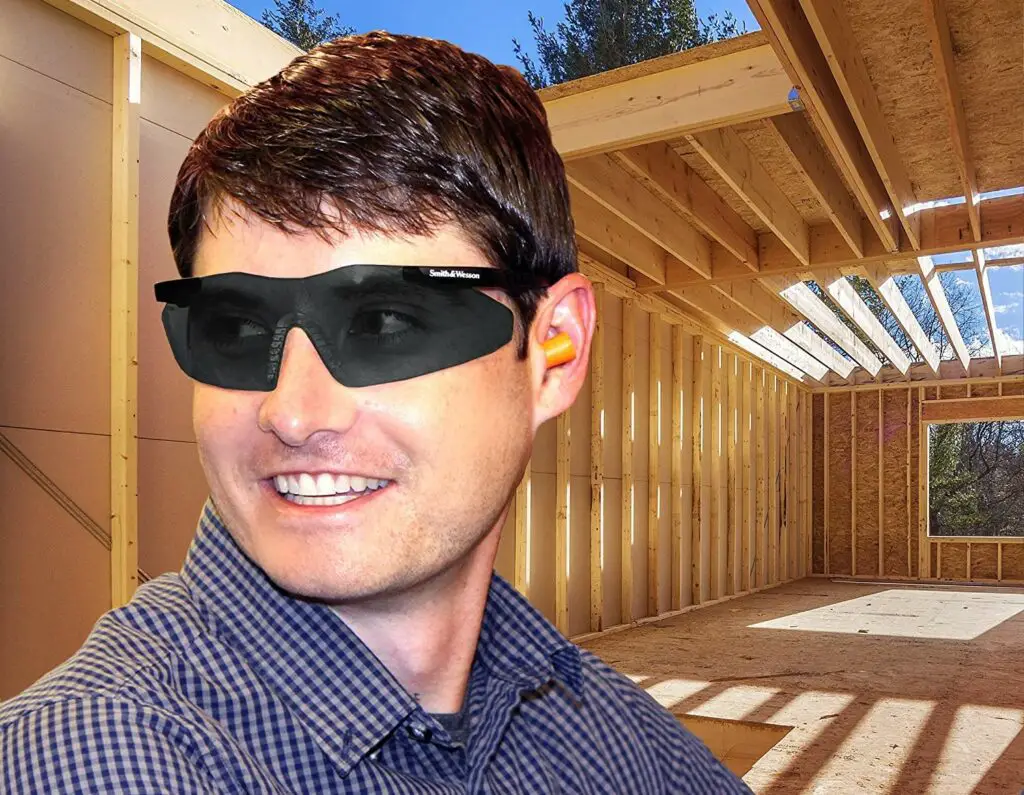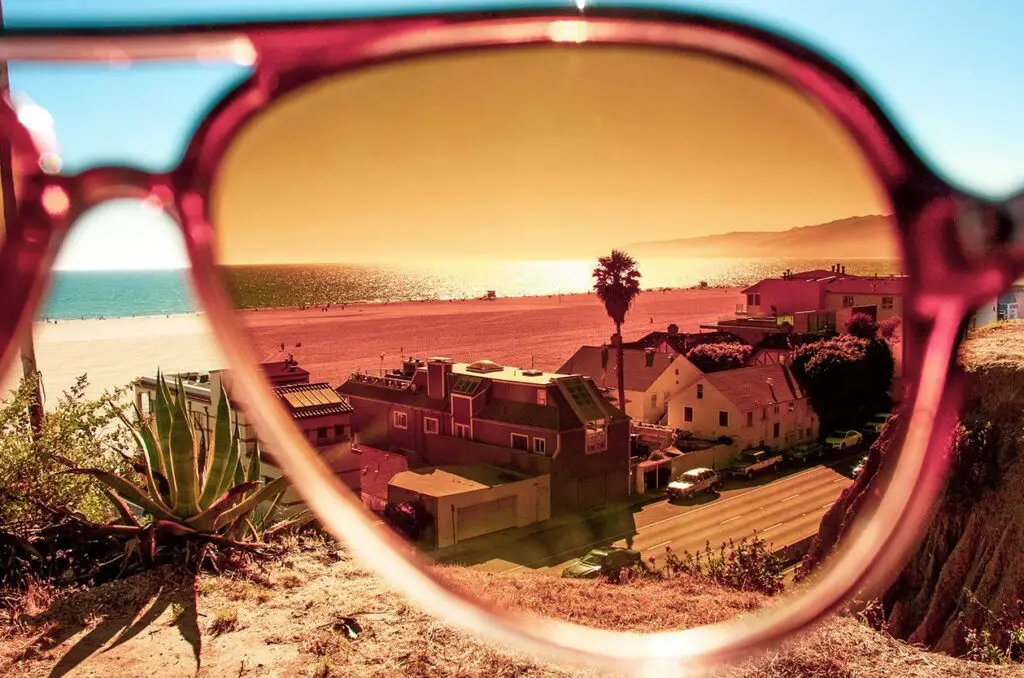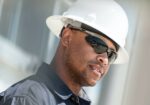Your eyes are the most important yet extremely delicate part of your body. Therefore, they need protection so that they can serve you for a long time.
Safety glasses are an important part of Personal Protective Equipment (PPE) that is required in any workplace that poses potential danger to its employees. They’re heat-resistant and can withstand a lot of impact keeping your eyes safe.
YES, you can use your safety glasses as sunglasses provided the lens in your safety glass comes with UV protection and anti-radiation features, which indicates that the glasses are equipped to protect you from harmful ultraviolet rays of the sun. Usually, most safety glasses do come with these features for the overall protection of your eyes.

Your safety glasses may or may not come with UV resistant features, therefore, you need to know the basic signs and symbols when it comes to buying safety glasses.
Coated safety glasses are often labelled with symbols, such as:
“L”- means rating for Visible Light Filters
“R”- means rating for Infrared Filters
“V”- it means photochromic (or transition) lens designation
“U”- it means Ultraviolet rays protection
“W”– a welding designation
“S”- special purpose lens designation
So if your safety glasses have L, R, V or U marking, it does the job of your sunglasses, with additional impact protection.
Differences between safety glasses and sunglasses
1.) Safety in terms of impact- Sunglasses are designed to shield your eyes from the harmful effects of UV radiation. This implies they must provide 100 percent UV protection and have a specified level of tint. They don’t have any rules on lens thickness, frame stiffness, or fitting.
On the other hand, safety glasses have to go through a lot of testing so that the eye socket and the eye itself are entirely protected.
A small bridge width, side shields, or a wraparound frame with side protection complete this look. Medium impact lenses that have been rigorously tested and a durable frame.
2.) Strength in terms of frames- The frame and lenses used in safety glasses are more durable than those used in sunglasses. When an object collides with the lens of safety glasses, the lens is unlikely to break. This is not the case with your sunglasses.
When an item impacts the lens of sunglasses, the lens can shatter, leading to damage on the wearer’s eye. The lens may break, but it will not shatter back into the eye if worn with certified safety glasses.
3.) Safety shields- Side shields are frequently used in safety glasses to prevent foreign items from entering the eye from the sides, top, or bottom. However, sunglasses do not have this safety feature.
4.) Protection from radiation- Some people incorrectly assume that because sunglasses have a darkened lens, they will provide enough protection during welding, brazing, or cutting.
But this isn’t true. Your eyes will not be protected from infrared or ultraviolet rays if you wear a darkened lens. It’s possible that wearing glasses with darkened lenses that aren’t suited for industrial usage is riskier than not wearing any glasses at all.
Because the pupil expands to compensate for the absence of light, this happens. As a result, more potentially harmful radiation is let into your eyes. The lens must be of a certain tint to provide appropriate protection from visible light produced by welding.
Okay, let us imagine a scenario. Just in case you do not have safety glasses, can you rely on your sunglasses to fully protect you from harmful radiation and UV?
Your new sunglasses may seem stylish, but they’re just good for style if they don’t block out the sun’s dangerous ultraviolet (UV) rays. After all, not every pair of sunglasses is the same. They may or may not be doing their job to protect your delicate eyes.

But most sunglasses now have UV protection built into the lens rather than being coated on top of it, and most high end manufacturers indicate UV protection on their labels. Look for a label that has UV protection written.
However, if you’re not a fan of safety glasses, we’ll give you some tips on what to look for in a pair of sunglasses to ensure that your eyes are properly protected. You don’t need to spend a lot of money on UV-protection glasses, but here’s what you should know:
→ Dark shades that do not filter harmful rays can help you squint less in bright light, but that’s about it. When you wear a pair of really dark shades, your pupils dilate and let considerably more light into your eyes than if you didn’t wear them at all.
While they may block out ambient light and glare, the increased UV exposure raises your risk of cataracts, macular degeneration, and possibly ocular melanoma, a rare type of cancer.
→ If you spend a lot of time outside, especially near water, wrap-around sunglasses that block UV rays from the sides are a good option.
This design will help keep the wind out of your eyes, which might cause them to dry out. They do not have to be costly. They simply must fit properly, and you must wear them for as long as you are in the sun.
Although polarization has nothing to do with UV light absorption, many polarized lenses come with a UV blocking feature already installed. Check the label to ensure that the lenses offer the best UV protection. The same may be said for tinted lens colored lenses, and mirror coated lenses.
Recommended safety glasses that gives you the benefit of sunglasses are
1.) Professional UV Light Safety Glasses
Anywhere UV light is involved and your eyes need protection and this pair of protective glasses will prevent any harm to your eyes.
Check them out here-
- Suitable for a wide variety of professional and home uses...anywhere UV light is involved and your eyes need protection! They’re also great for blocking blue light! Note: May not fit over regular glasses, unless the regular glasses have very thin frames.
- 【Get Long Lasting Safety】No more heavy, uncomfortable safety goggles! These glasses are lightweight and flexible, with a non-slip frame, yet durable. They come with shatterproof lenses made of polycarbonate plastic.
Prices pulled from the Amazon Product Advertising API on:
Product prices and availability are accurate as of the date/time indicated and are subject to change. Any price and availability information displayed on [relevant Amazon Site(s), as applicable] at the time of purchase will apply to the purchase of this product.
2.) FreeMascot Professional Safety Glasses
This is a laser safety pair of protective glasses that doesn’t let any harmful light and radiation penetrate through the glass and into your eyes.
Check them out here-
- Wavelength: 190nm-490nm, Optical density: OD 6+
- Sport design frame made of original DuPont PA12 and TPEE
- Visible light transmittance: 55%
- EN207: 1998 + A1EN207: 1998 + A1: 2002 approved (European laser eyewear standards for laser safety eyewear).
- Compatible with 275nm, 365nm, 405nm, 445nm, 450nm laser li
Prices pulled from the Amazon Product Advertising API on:
Product prices and availability are accurate as of the date/time indicated and are subject to change. Any price and availability information displayed on [relevant Amazon Site(s), as applicable] at the time of purchase will apply to the purchase of this product.
3.) Smith and Wesson Safety Glasses
These lightweight, super comfortable safety glasses are an ideal fit if you have to put on protective glasses all day.
Check them out here-
- These Smith and Wesson Magnum 3G Safety Glasses have a black frame and smoke lenses – ideal for outdoor use
- Smith and Wesson Magnum 3G Safety Glasses meet ANSI Z87.1+
- These gun glasses have polycarbonate lenses that provide 99.9% UVA/ UVB/UVC protection to help prevent eye damage like cataracts, retinal damage, and other conditions that can cause temporary vision loss
Prices pulled from the Amazon Product Advertising API on:
Product prices and availability are accurate as of the date/time indicated and are subject to change. Any price and availability information displayed on [relevant Amazon Site(s), as applicable] at the time of purchase will apply to the purchase of this product.
FAQs-
When should you wear sunglasses?
You’re always exposed to UV radiation, whether it’s winter or summer.
If you’re near or on a body of water, wearing eye protection is extremely vital.
You receive not just direct sun exposure, but also reflected light from the sea, and snow may reflect sunlight too. Therefore, sunglasses are an essential item that needs to be used frequently.
When should you use safety glasses?
Safety glasses are usually used in construction sites or labs where anything can harm your eyes. If your workplace has dust particles, toxic sprays, flying objects, or dust, you must at least wear safety glasses. You need these protection glasses as they are impact-resistant too.
To conclude, you can either choose safety glasses for your overall protection or simply go for sunglasses to protect your eyes from UV rays. Depending on where you want to use them.
However, safety glasses do come with UV protection features where it protects your eyes and also gives you all the benefits of sunglasses.










